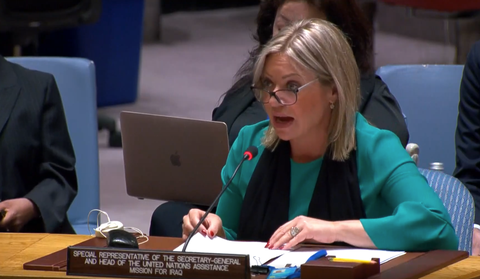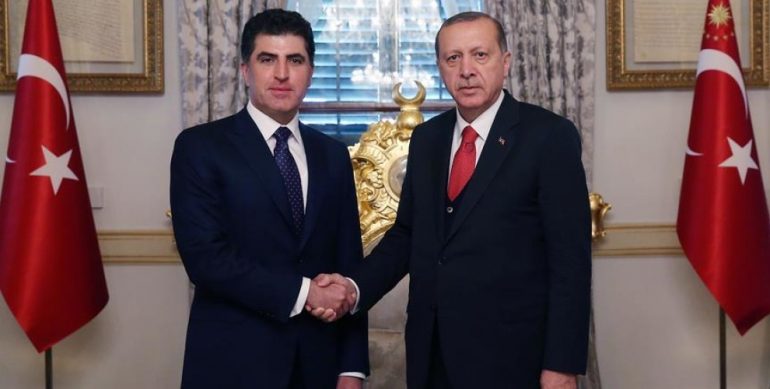Iraqi, Kurdish security forces arrest dozens of suspects on terrorism charges
Joint Baghdad-Erbil effort nabs suspected people smuggler wanted by Interpol
Iraqi authorities have announced the arrest of an internationally wanted suspect on charges of smuggling migrants to EU countries. A statement by the Iraqi Ministry of the Interior stated that the arrest was executed through high-level intelligence coordination between Baghdad, Erbil, and Interpol.
The identity of the suspect hasn't been revealed. However, Qatari outlet Al-Araby Al-Jadeed cites a KRG official who claimed the suspect was responsible for transporting Iraqi citizens by air to other countries using transit and tourist visas.
The transit locations included Damascus, Dubai, and Istanbul, from where the migrants were transferred to Belarus. They then traveled overland to other EU countries.
The source described the suspect as an "international broker," whose activities resulted in dozens of Iraqi families facing major humanitarian dilemmas at the borders between 2021 and 2022. He reportedly charged each family between $5,000 and $10,000 to transport them to the Belarusian borders with Poland and Lithuania.
In 2022, Iraq evacuated over 4,000 citizens, mostly from the Kurdistan Region, stranded on the Belarusian border. Al-Araby Al-Jadeed added that Iraqi officials had blamed human trafficking networks for pushing Iraqis into unlawful migration to the EU. These officials alleged that these networks were colluding with the Belarusian government to exert pressure on the EU.

On the upcoming parliamentary elections, scheduled for November (after postponement from last year), head of UNAMI, Jeanine Hennis-Plasschaert, tells the UN Security Council that "another postponement would be detrimental to public trust."
Full statement
This is a significant multiplier of threats to Iraq's stability.
The priority placed on the issue of water security by Iraq's government is therefore most welcome.
And plans for the extensive updating of Iraq's water management systems are set to be underway.
This will be vital in meeting demands driven by population growth and urbanization.
Now, the fair sharing of resources among Iraq's neighbors is equally important.
If water is a competition, everyone loses both domestic actions and close regional cooperation offer the only winning solution.
On that note, I also wish to draw attention to a simple fact, which is that regional security, economic and political developments do and will continue to impact Iraq.
I therefore cannot overstate the importance of the government's efforts to scale up diplomacy with and among its neighbors in a number of areas from border security and trade to water sharing and climate issues.
Of course, regional stability will also hinge on respect for the principles of sovereignty, territorial integrity and good neighborliness.
Full statement on Sinjar from UNAMI chief:
We can only express disappointment that little to no progress has been made in the implementation of the 2020 Sinjar agreement.
This is despite the repeated declarations of commitment to state.
The obvious such stagnation creates further space for spoilers of different backgrounds and affiliations to exploit the situation to their own ends.
And it blocks thousands of displaced Sinjarris from returning to their areas of origin.
Sadly, a recent rise in tensions between communities in Sinjar was in large part further fueled by online disinformation targeting the Yazidi community.
Local leaders from all sides have collectively worked to dispel this spike intentions but challenges to reconciliation will persist until meaningful steps are taken including those towards a unified administration, stable security structures and reconstruction.
Now with the inclusion of the 2020 sin Agreements as an explicit priority in the government program, it is high time to get things done.
UNAMI chief The head of UNAMI urges for more proactive policymaking in anticipation of future issues and formalizing the relationship between Baghdad and Erbil to ensure smoother cooperation.

On the relationship between Erbil and Baghdad, Hennis-Plasschaert says it can be best described as "good but complicated."
Referring to KDP-PUK tensions, she says "fighting in the Kurdistan Region did not help as it also affected the relationship with partners in Baghdad."
Hennis-Plasschaert says conflicts between KDP and PUK in recent months drove the Kurdistan Region "close to the brink."
Head of UNAMI Jeanine Hennis-Plasschaert says Baghdad showed resolve to combat corruption, over-reliance on oil revenues and other challenges facing the country.
She says the main issues still facing the country include:
Full statement:
Foundation laid on $100m solar power plant
The foundation has been laid for the first major solar power plant in Erbil with a 25 megawatt capacity. This eco-friendly facility, part of a $100 million project, is set to feed into the national power grid and is expected to be operational within a year.
The plant, spanning 590 acres, is located on the outskirts of Erbil. Prime Minister Masrour Barzani announced the ambitious project at the inaugural ceremony, expressing the government's commitment to ensure a sustainable electricity supply for citizens.
Barzani urged citizens to adopt responsible electricity usage habits and regularly meet their tariff obligations, a move that will help the government manage the significant production costs.
He noted that, despite a surge in power production, the government has been unable to provide round-the-clock electricity due to increasing demand.
The Kurdistan Region suffers from chronic shortages in mains electricity, with neighborhoods having to rely on environmentally unfriendly fossil fuel-powered local generators that emit both environmental and noise pollution.
The PM also boasted the low-cost electricity provided by the government, which significantly undercuts the actual costs of production, transportation, and distribution. In return, he implored citizens to use electricity economically and less wastefully. Barzani promises that by paying electricity bills regularly, citizens can expect 24 hour mains power.
Barzani affirmed the Kurdistan Regional Government's commitment to improving public services, emphasizing the mutual responsibility between the government and citizens in this endeavor.
Interestingly, the ceremony was held in the presence of Chinese representatives, with the project getting Chinese investment. China continues to extend its economic footprint by investing heavily in infrastructure projects across developing countries, like this one in Erbil. This financial commitment is viewed as part of China's broader geopolitical strategy, commonly referred to as the Belt and Road Initiative. Through such investments, China seeks to foster diplomatic alliances, expand trade routes, and secure access to vital resources, thereby consolidating its global influence.
Sulaymaniyah security forces announced on Wednesday that they had seized over 120 kilograms of narcotics and arrested two drug dealers. The seizures represent a mere fraction of the region's rampant illegal drug trade.
The Asayish (security) forces in Sulaimani did not disclose the full names of the arrested dealers, providing only their initials, though they published the list of different drugs seized.
According to the force’s official Facebook page, the seizure included 10 kilograms of cocaine, 75 kilograms of crystal meth, 30 kilograms of amphetamines, and 5.6 kilograms of opium.
Since the US invasion of Iraq in 2003, the country has become a conduit for narcotics. Drugs such as Captagon, produced in Syria, are transported to the rest of the Middle East via Iraq, while numerous other drugs originating from Iran and Afghanistan are delivered to the West.
Addressing the drug issue earlier in May, Iraq’s prime minister emphasized that combating narcotics in the country was as critical as fighting terrorism. “The drug issue poses a significant threat to societies and state entities; the war against drugs is no less dangerous than the war against terrorism,” he stated.
Federal and Kurdish security forces have collaborated on several occasions to tackle the phenomenon, but often the strategy is applied equally to drug users and dealers.
Iraq as a whole, including the Kurdistan Region, lacks the necessary infrastructure and educational systems to effectively combat narcotics. Prisons are frequently overcrowded with both dealers and users, and lack a rehabilitation system to ensure that those arrested can reintegrate into society without drug dependence. The failure to implement a suitable rehabilitation system has repeatedly led to many users reverting to drug use after their release from prison.
According to Iraq’s Narcotics and Psychotropic Substances Law, all dealers are subject to a life sentence, leaving many with no opportunity for redemption.
US mediation efforts to reopen Semalka border crossing fail
Just in: Shaswar Abduwahid, leader of Kurdistan Region's largest opposition party, New Generation Movement (NGM), reiterates call for holding parliamentary elections on time.
President Nechirvan Barzani warmly congratulated President Recep Tayyip Erdogan of Turkey, during a phone call Wednesday evening, on the victory of the Justice and Development Party (AKP) in Turkey’s general elections, and wished him success in the second round of the presidential elections.
President Nechirvan Barzani reiterated that the Kurdistan Region attaches importance to the elections in Turkey, and expressed delight at the success of the democratic process and the peaceful elections held in the country with a high turnout.
The President also expressed optimism and confidence in President Erdogan’s victory in the upcoming round of the presidential elections, and considered his victory as necessary and critical for the people of Turkey and the future juncture.
In response, President Erdogan expressed his and the AKP’s appreciation for the congratulatory call of the Kurdistan Region President, and showed his country’s keenness to further develop relations with Iraq and the Kurdistan Region.
Here's what's on the agenda for today
- In a gushing statement, Kurdistan Region President Nechirvan Barzani expresses "optimism" about an Erdogan victory in Turkey's second round of presidential elections.
- Kurdistan Region border authorities extend deadline for NGO workers, journalists and KR residency permit holders to cross the Semalka border before it is shut for good.
- KDP politburo bigwig Fazil Mirani talks to Voice of America Kurdish and rejects allegations of interference in the PUK's internal affairs.
- We will keep an eye out on the UN Security Council meeting on Iraq.













